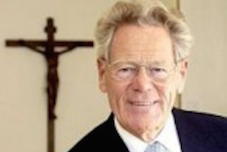Catholic academic responds to Hans Küng Open Letter to Bishops

Professor Pierre Piccinin
I tell you, you are Peter, and on this rock I will build my church (…) I will give you the keys to the of kingdom of heaven, and whatever you bind on earth shall be bound in heaven, and whatever you loose on earth shall be lost in heaven (Matthew, XVI, 18-19).
These were, according to the Holy Scriptures, Jesus’ words, speaking to the Apostle who would become later the first bishop of Rome, a charge which he passed onto his successors and to which the Conclave, inspired by the Holy Spirit, chose Joseph Ratzinger, who took the name of Benedict to wear Saint Peter’s sandals. Since then, even though we do not doubt that the Roman Church does not only have friends in this world, we are nonetheless surprised by the ferocity put by some Catholics in crucifying Peter’s successor, who is already victim of violent attacks from those who, some months ago, have chosen the Holy See as their target.
Among those Catholics, from which more solidarity and support could have been expected for the legitimate leader of the Church, was the Swiss theologian Hans Küng, in a Open Letter to the Catholic bishops. Having taken part in the Second Vatican Council, Hans Küng, who was teaching Catholic theology at the University of Tübingen, saw, nonetheless, how his missio canonica was withdrawn by Rome: partisan of an out of control ecumenism, he had taken stands opposed to the teachings of the Church. Nothing surprising, then, that his open letter has no mercy for the Vatican. But, at least, it could be fair play, if the arguments used were well founded and, even more, if the text could not be blamed for a lot of omissions…
To begin with, Hans Küng attacks Benedict XVI, that 'old and reactionary Pope', on the matter of the 'come back into communion' with the Church of anti-Semitic and schismatic bishops. This critic is repeated several times. The argument is strong and it is used with extent; we can read: he has taken the bishops of the traditionalist Pius X Society back into the Church without any preconditions.
If we had no knowledge of this person and his mastery on Church matters, we could think it is a mistake, an error of the profane or the badly informed. But, coming from an eminent theologian, we are forced to assume there is indeed bad intention. So, at the very beginning the tone is settled… Hans Küng contributes to the confusion that pervades the Pius X Society, because Benedict XVI has never 'taken back' into the Church the schismatic bishops of Lefebvre. Even it is true that the excommunication decided by John Paul II has been dropped by Benedict XVI, that does not mean that the Pius X Society is now part of the Church, who has demanded several conditions for letting them back: the Pope has only made a gesture, looking for dialogue in favour of the unity of the Christians, and it is only the beginning of a long road, that one which might never even be undertaken; yet at this moment, th participation of Catholics in the worship of the Pius X Society is still not allowed.
Also: the attack against the will of Benedict XVI to beatify Pope Pius XII, who Hans Küng opposes to Judaism. Always the old process against Pius XII, accused of having kept silent about what happened to Jews during Second World War. Franklin Roosevelt, Winston Churchill or Charles de Gaulle were not more talkative, they, who were perfectly aware of the tragedy that was taking place in camps, in the east. Indeed, when Jewish associations asked the Allies to bomb the railways which carried the unfortunate to death, by hundreds of thousands, their cynical answer was that they had other matters to care for. Then, why this bitterness against Pius XII, less acceptable since it was him, as it has been established by historians long time ago, who organized the rescue of the Jews, with the help of all European monasteries? The Great Rabi of Rome has thanked Pius XII for this, on repeated occasions. And, as a secretary of Pius XI, he was one of the main writers of the encyclical Mit brennender Sorge that, in 1937, condemned Nazism, encyclical exceptionally written in German to be well understood.
Are these facts unknown to Hans Küng? Furthermore, talking again of the words of the Pope in Africa, about the use of condoms, even though it has been well proved that Benedict XVI did not condemn the use of condoms, contrary of what a sentence out of context might let think; he wanted to emphasize that, besides the use of condoms, fidelity in a couple and respect of the partner are a far better means to fight the spread of the disease.
And, of course, adding as well comments on paedophilia matters which are rocking the Church. Will Hans Küng continue to be ignorant to the fact that the popular John Paul II dealt with these delicate matters internally, and that we owe Benedict XVI the fact that everything has come to light?
Will not he know that it is Cardinal Joseph Ratzinger, then prefect of the Congregation for the doctrine of faith, who, under John Paul II, was fighting so that the criminals of sexual abuse were subjected to specific measures?
Who convinced John Paul II to create a commission in charge of making all these facts as clear as possible? Who, in the Curia, fought to reopen dossiers that had long been abandoned? Not a word about this reality. Let him feel the urge to call forward scandals and the refusal to accept Benedict XVI’s will of transparency…
In addition, there is the accusation put forward of the Pope betraying the ecumenist intentions of the Second Vatican Council. But, is it not Hans Küng who, in his theological vision, has left the Church for a relativism that suits well, according to the times, where all religions will lead to salvation? The Catholic Church is it not then universal? In this case, it is not catholic any more (catholicos : universal). The antireligious dialogue, nonetheless, would now be universal... From a catholic point of view, it is crystal clear that Hans Küng has gone down the dangerous road of the Reform. To end and among other easy summaries and double talk sentences, he asks for a new Council that will take control of everything and put this authoritarian Pope and his old Curia jealous of its privileges in the place they deserve.
Hans Küng reminds us that 'the Council, according to canon law, represents the highest authority in the Catholic Church'. Isn’t this again wicked, since the hypothesis of ignorance has to be excluded? Or schizophrenia? We have to consider that, if Hans Küng had to renounce to teaching theology, it was precisely because he had contested the Councils resolutions, in particular resolution of First Vatican Council about papal infallibility. Yet, on the contrary, not a single word about the impressive social message of Benedict XVI, well-worded in his recent encyclical Veritas in Caritate (which is nonetheless quoted), in which the Pope blames multinationals corporations and calls governments to take control of economy and its rules; he condemns the impoverishment that has reached the middle class in rich countries, delocalisation, the weakening of social State, the lack of rules in the labour world and invites Trade Unions to resist and to defend workers going as far as calling for an international organization to face globalization. Nevertheless, that speech, the call of a sovereign pontiff with a great heart, in favour of the most humble and poor, does it still allow Hans Küng to reach the conclusion of painting an image of Benedict XVI as that of an old Pope, conservative and reactionary?
The question remains, for which church is Hans Küng preaching? Certainly not the Catholic Church in any case...
Pierre Piccinin, Professor of History and Political Science, European School of Brussels. Website: pierre.piccinin-publications.english.over-blog.com/pages/answer-from-a-roman-catholic-to-the-swiss-theologian-hans-kung-2982663.html
To read Hans Küng's original letter, see: www.indcatholicnews.com/news.php?viewStory=15996

















